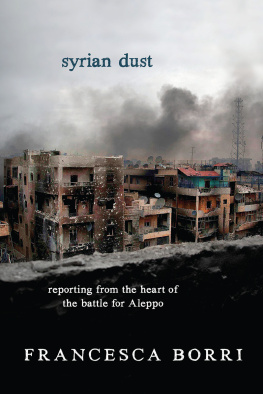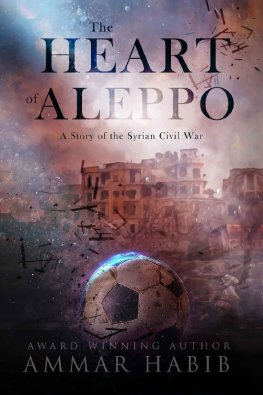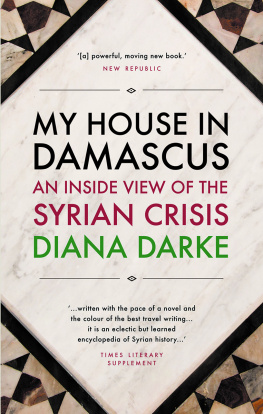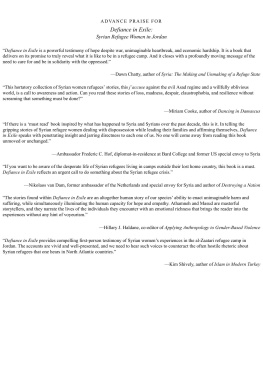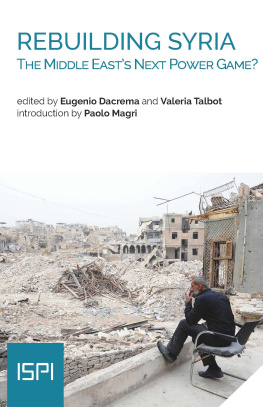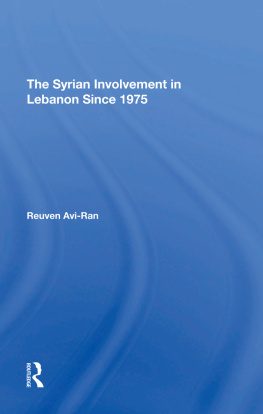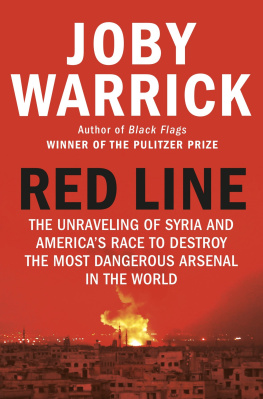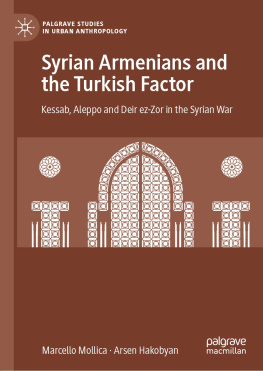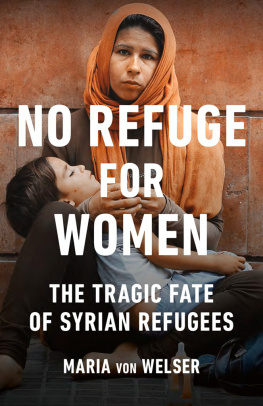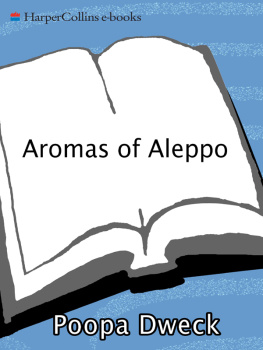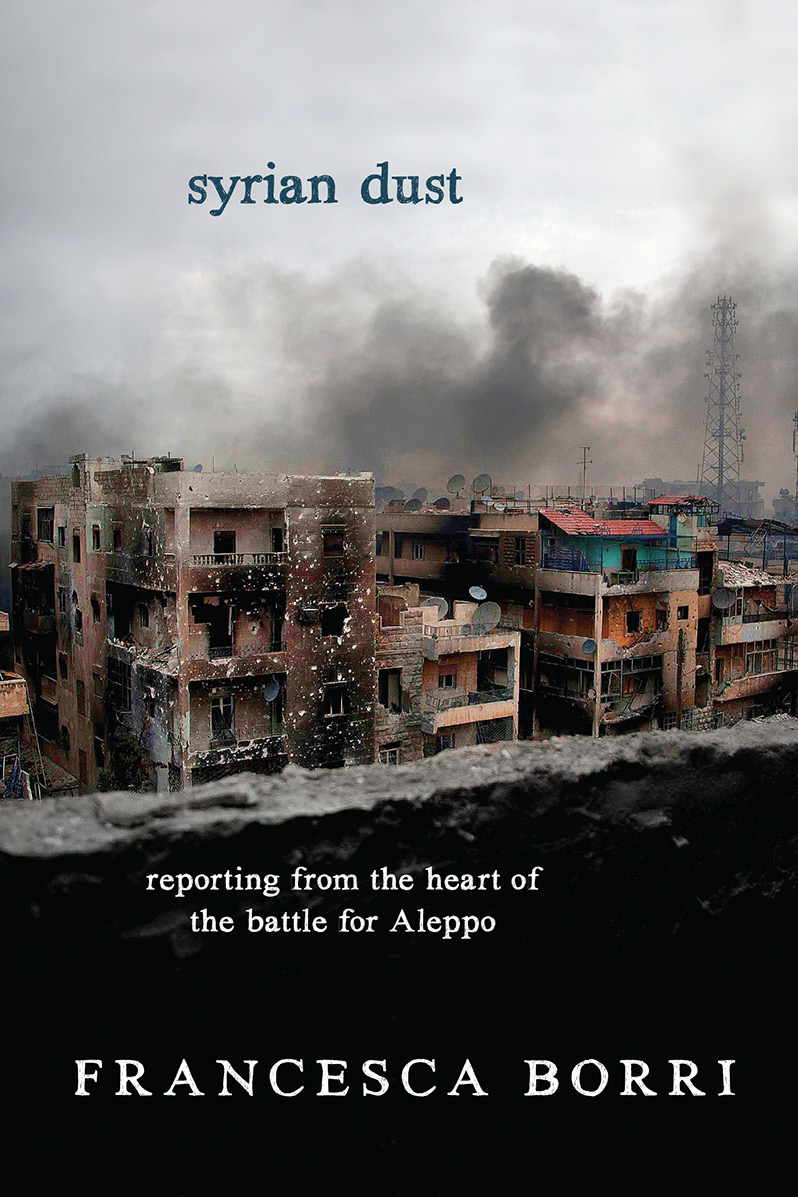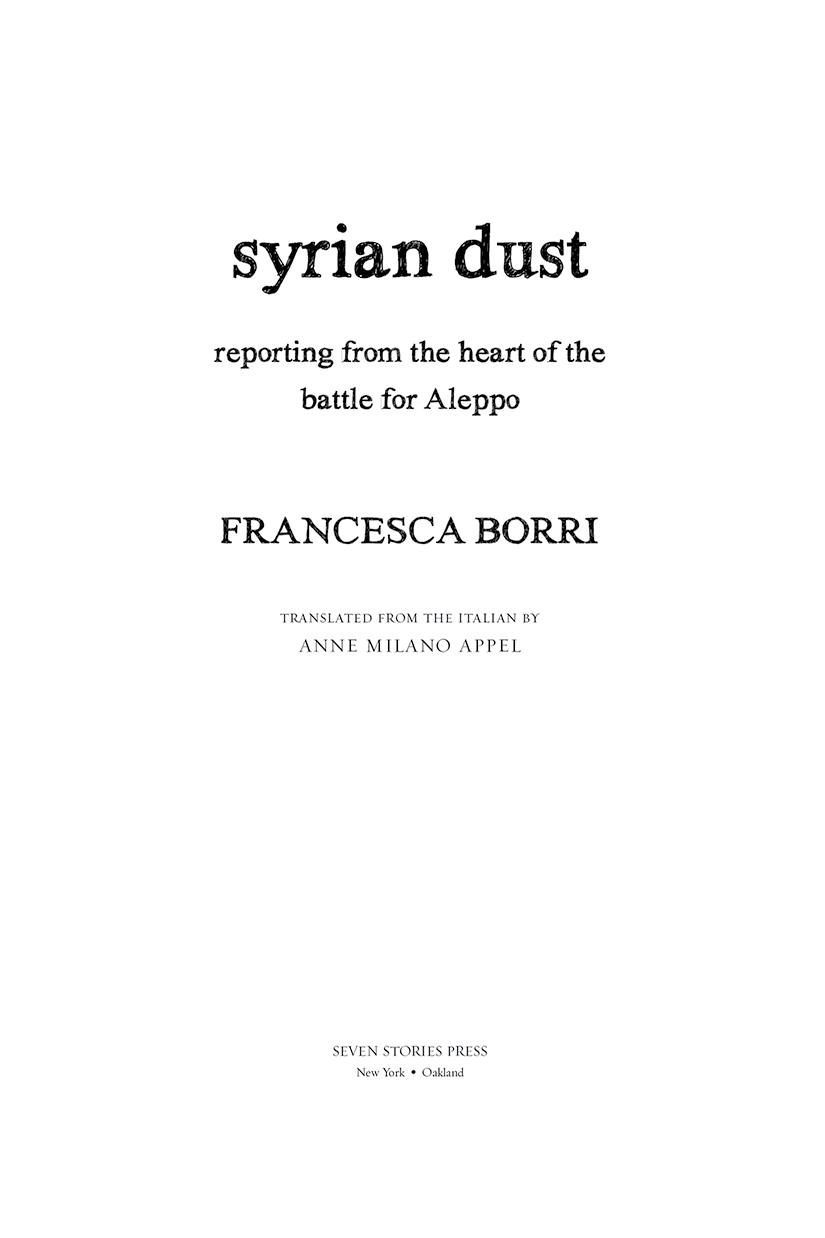Copyright 2015 by Francesca Borri
English translation 2016 by Anne Milano Appel
First Seven Stories Press edition March 2016
All rights reserved. No part of this book may be reproduced, stored in a retrieval system, or transmitted in any form, by any means, including mechanical, electronic, photocopying, recording or otherwise, without the prior written permission of the publisher.
Seven Stories Press
140 Watts Street
New York, NY 10013
www.sevenstories.com
Library of Congress Cataloging-in-Publication Data
Borri, Francesca, author.
Syrian dust : reporting from the heart of the battle for Aleppo / Francesca Borri ; translated by Anne Milano Appel.
pages cm
ISBN 978-1-60980-661-3 (paperback)
1. Borri, Francesca. 2. Syria--History--Civil War, 2011---Personal narratives, Italian. 3. Women war correspondents--Italy--Biography. 4. Women war correspondents--Syria--Biography. I. Appel, Anne Milano, translator. II. Title.
DS98.72.B67A3 2016
956.91042--dc23
2015025053
College professors and high school and middle school teachers may
order free examination copies of Seven Stories Press titles. To order, visit
, or fax on school letterhead to (212) 226-1411.
Book design by Jon Gilbert
Printed in the U.S A
9 8 7 6 5 4 3 2 1
To Stanley Greene
Shut your eyes and see.
james joyce
CONTENTS
T he most dangerous place here is the hospital. You arrive, and its the first thing they tell you: if you want to feel safe, stay at the front.
Abandon all rules, ye who enter here. All logic. Aleppo is nothing but explosions these days. Exploding. Everything explodes and topples. And when you venture out in search of water, when youre hungry, thirsty, theres nothing but snipers everywhere. Assads planes are suddenly strafe bombing, rushing at you in maelstroms of windwind, and dust and flesh. But they are so imprecise that they never bomb the front lines: theyd risk hitting the loyalists instead of the rebels.
The unit of the Free Syrian Army in which were embedded consists of thirteen men, two in flip-flops, while the others dont always have two shoes that match. There were seventeen of them, three died trying to recover the body of a fourth man that is still out there, at the end of the street. Their base is a school, and each of them has a Kalashnikov and a knife. In the principals office, a child polishes the family silver: two rocket launchers and a rifle. Except for the captain, an officer who left Assads troops six months ago, theyre just young kids of seventeen, eighteen. Alaa is studying philosophy, and between shifts he reads Habermas. Deserters are easily recognizable: they stole their camouflage shirts from the barracks. The others wear T-shirts sporting Messi or Che Guevara.
The Syrian Spring has turned into the Syrian War. And the evolution can immediately be perceived in the difference between the Lebanese border and that of Turkey. Beirut is a refuge for the most notorious activists: the ones who started it all in March 2011, demonstration after demonstration, protest after protest. The ones from whom the Free Army, in a sense, seized the revolution. They not only helped us journalists cross the border illegally, but, more importantly, they enabled us to understand their motives and demands. Now the border with Lebanon is inaccessible, however, guarded mile after mile by Hezbollahs men. Allies of the regime. On the other hand, the border with Turkey has been opened: the rebels control the passport office, a doormat at its entrance portraying Assad. But this new Syria of which they are the self-appointed spokesmen is honestly an unknown. Difficult to discuss politics here. Useless to inquire about UN negotiations, about Islam. About Sunnis and Shiites. For the rebels, the main thing is to have us fork over $300 apiece: the fee they charge for a tour of Aleppo under attack. Journalists are the big business of the day.
Because, in theory, there are four fronts. But the truth is that there is only one front here: its the sky. And those who have nothing but bullets to use against the fighter jets havent got a chance. Without intervention from the West, as in Libya, the Free Army cant win. And so, for now, its trying not to lose. Theyre defending positions in Aleppo, nothing more. Theyre not advancing.
On average today, at al-Shifa hospital, theres been one death every three minutes and thirty-seven seconds. To reassure the population, the rebels drive around in jeeps rigged out with Dushkas, old Soviet machine guns, but a machine gun placebo against a fighter plane has about as much effect as a peashooter. Most importantly, to reassure the worldto convince it that they are deserving of weapons and supportthe rebels drag the rest of us to the front, exposing us to invisible loyalist snipers. Two, three of them crouch at the first intersection, a hundred yards away. Then they dash across, upright, blindly spraying rounds with the Kalashnikovs. Up and down. As cameras flash. When they cross back, when they return to our side, they dont ask if theyve hit the enemy. They ask: How did the photo come out?
Every so often, doubling as stunt men for themselves, they forget to release the safety catch.
Meanwhile everything around is exploding: exploding and collapsing. As soldiers play, children die. There should be civilians and combatants in Aleppo, there should be a fronta here and a there. Instead there are no rules. Theres no asylum. Ambulances are loaded with ammunition, mosques converted into military posts. Refugees in the barracks, explosives in the fire extinguishers, undergraduates at the front working on their dissertations, students at the university bombed while in class. Mines in the parks, corpses among the swings. Rebels wearing loyalist uniforms. Loyalists without uniforms. And this base were settled in looks more like an occupied high school than an army unit. Its one continuous fight. Whose turn to cook, how to capture the next block. What tactic to use. You stole my boots, no, youre the one who stole my blankets. And its only a microcosm of what happens among the various armed groups, and more generally speaking, among the various opposition groups. Because the Free Army should eventually hand over its power to the National Council, that government-in-exile of sorts based in Istanbul, but there is no sole leadership and no sole strategy. Neither among civilians nor the military. And this, more than any arsenal, is Assads real strength.
In and out of the classrooms, amid the Kalashnikovs and grenades, there are children running around. Ahmed is six years old. Today Ill teach you to be a true Syrian, the commander tells him. A free Syrian. He hands him his Beretta and makes him fire a shot in the air, in these narrow streets flanked with eight-story buildings, their windows already smashed in. Another one shatters. A woman, her hair in a braid, skirt down to her ankles, runs out frightened. The bullet got wedged in her kitchen. She grabs my pen and notebook. What kind of Syria will ever emerge, she writes, from men like these? And she goes back to her cubbyhole under the stairs.
a hand pulls me to the ground, and the bullet, a few feet overhead, rips into the wall.
Id wondered where the inhabitants of Aleppo had gone. There are over two million of them, according to the latest census, 2,132,100 they say, and two-thirds seem to be still here, in these rubble-strewn streets besieged by snipers. But the houses, blasted by artillery fire, are empty: a lamp, a curtain, fossils of normal lives dangle in the wind from structures left gaping, torn open by the bombs. Even a cat here, curled up in a chair, appears to be sleeping, but its dead.

